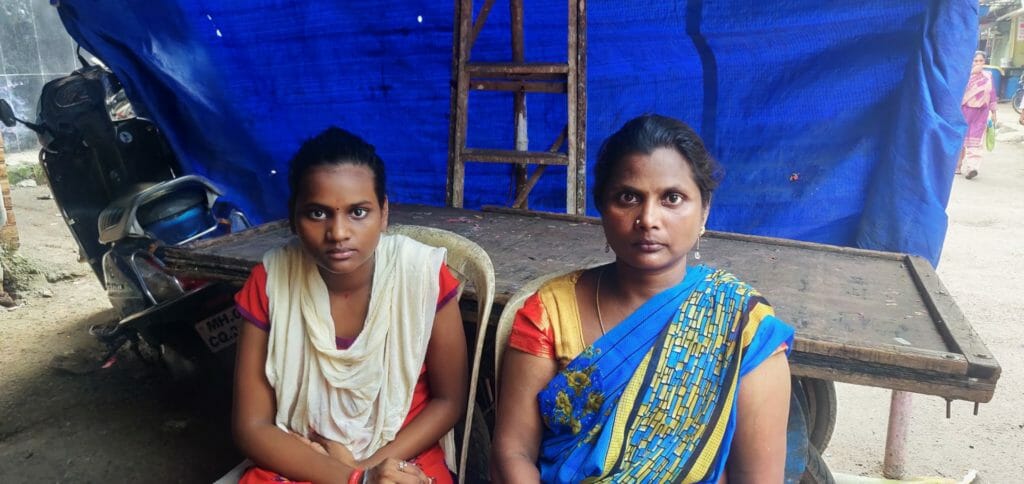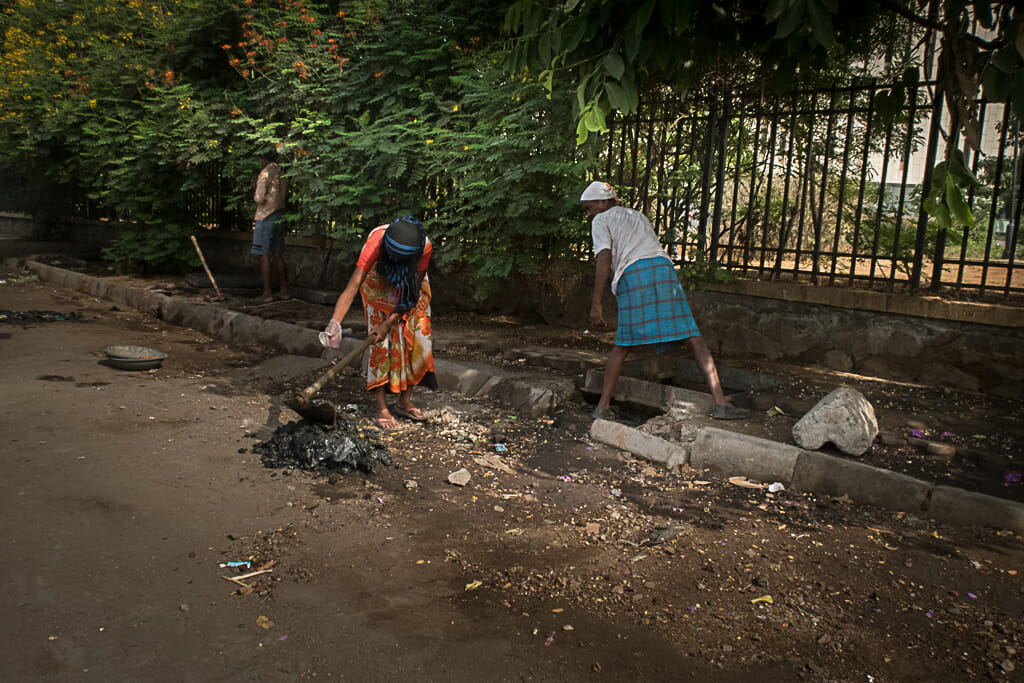March 10 2022, is the date that Priya, 16, and her mother Laxmi, 39, will remember for the rest of their lives. On that date, Priya’s father Annadurai, 50, lost his life while working in Mumbai’s Kandivali area. He was one of three men employed for manual scavenging, a practice that removes human excreta by hand from sewers or septic tanks. This work was supposed to pay each of them Rs 500.
Annadurai was a sanitation worker under private contractors. He was hired for work at Kandivali along with his three friends – Rauf Syed, Krishnamurti and Ganpati. With no safety gear or machinery of any sort, they had to clean the septic tank of a Brihanmumbai Municipal Corporation (BMC) toilet.
Annadurai first stepped inside the tank to clean it, but couldn’t tolerate the smell and fell unconscious. Rauf and Ganpati met with the same fate in an attempt to rescue him; the three died due to asphyxiation.
Manual scavenging is prohibited but continues

The practice is rooted in the Hindu caste system, whereupon dominant caste groups force members of the Scheduled Castes (SC) to perform such acts. A total of 58,098 people were identified as manual scavengers late last year. Caste-related data was available only for 43,797 of them out of which 42,594 (97.25%) belonged to SC communities, 421 belonged to the Scheduled Tribes, and 431 to Other Backward Classes.
Manual scavenging was banned in 1993 and is a punishable offence under the Prohibition of Employment as Manual Scavengers and their Rehabilitation Act, 2013. The cleaning of septic tanks falls under BMC’s Solid Waste Management Department (SWMD) and the de-silting and cleaning of sewers are the responsibility of BMC’s Sewerage Operations Department (SOD).
“Non-profit organisations manage BMC toilets. I don’t know if they hire private contractors who further hire manual labour, but BMC uses de-sludging machines for septic tank cleaning. The cases (of manual scavenging) that you may have heard were not hired by BMC, but private contractors,” says SWMD Chief Engineer Bharat Torne.
However, the Commissioner of the Social Welfare Department Dr Prashant Narnaware stresses that it is the responsibility of a local corporation, in this case, the BMC, to see to it that manual scavenging should not occur in the first place. “Municipal Corporations need to see to it that they give the contract to such people who do not promote any kind of manual scavenging. It is their responsibility,” he says.
Read more: Despite law prohibiting manual scavenging, practice rampant in the city
BMC Commissioner Iqbal Singh Chahal and Additional Commissioner Sanjeev Kumar, under whose jurisdiction SWM falls, remained unavailable for comment. Speaking about septic tank cleaning at residential buildings, SWMD’s former Chief Engineer (who did not wish to be named) says, “BMC uses machines for septic tank cleaning (of residential buildings) in suburbs and partly within the city. Most buildings that have septic tanks are in the suburbs, buildings within city limits are largely sewer connected.” He adds that many societies hire private contractors to cut costs and this leads to cases of manual scavenging.
Meanwhile, SOD’s Executive Engineer Sudhir Kenia says it is only in “exceptional” circumstances that a man is asked to enter the sewer. “They are trained divers and they’re sent with a proper body suit and safety gear,” he says.
“We have enough machines across Mumbai to clean the lines under SOD. We are following the Prohibition of Employment as Manual Scavengers Act while cleaning sewers. There have not been any deaths while cleaning sewers under SOD in the last 10 years. The cases that exist have happened in private places or elsewhere,” says Kenia.
Do families know manual scavenging was outlawed?
Laxmi is a recovering TB patient and cleans utensils at a restaurant and in households in the area. “We didn’t know there is a law against such practices until now,” she says. When asked how life has been since the incident, Priya says, “We are surviving because my mother works. I have completed my 10th this year but haven’t been able to continue studies, because the fees are high.”
If Annadurai was alive, his daughter would’ve been able to study further right now. “I don’t want her to work, I want her to study. She is my only child, she is my life now. Anyhow, I will ensure that she can study ahead,” says Laxmi.
The family called themselves “Harijan”, a term sometimes used to describe Scheduled Caste communities. “It is unfortunate that people do not know this practice has been outlawed. It is our job to publicise it, we cannot allow our fellow human beings to be involved in any kind of degrading work. That is very wrong,” says Dr Narnaware.

Among the four friends, only Krishnamurthi returned home alive. The contractor was arrested and soon released on bail. Krishnamurthi was also arrested for being an accomplice, because he had taken the three to the contractor as the middleman. He too got bail soon after his arrest.
“The safety gear was going to arrive but the three decided to get inside before that,” Krishnamurthi claims. Rauf’s nephew Yusuf vehemently opposed this statement. All the victims were interviewed together in Mankhurd, where they reside. This was for the first time that Yusuf and Annadurai’s family realised that the other man whose arrest they had heard of, was none other than Krishnamurthi. “The contractor should have first ensured the safety gear and then sent the labourers there,” Yusuf tells Krishnamurthi.
No compensation received for deaths
The families claim that apart from a few people from various NGOs, no official has come to speak to them. “We knew he was a cleaner but had no idea about the extent of his work. After his death, we were told we would be getting some kind of compensation but nothing like that has happened,” says Syed Abdul Hameed, Rauf’s brother who does embroidery work.
The compensation for death due to manual scavenging is Rs 10 lakh, which the state government is liable to pay. Official figures claim that 971 people died while cleaning sewers and septic tanks from 1993 to 2022 across the country, out of which Rs 10 lakh compensation has been given to the families of 703 victims. 136 victims received less than Rs 10 lakh.
In Maharashtra, the data claims a total of 43 people died from 1993 to 2022 out of which families of 16 victims received Rs 10 lakh as compensation while two families received less than Rs 10 lakh.
“We have circulated guidelines and a GR (Government Resolution) which states that the concerned agency, under whose jurisdiction the death happens, will be held responsible for compensation. For urban areas, these agencies are municipal corporations, for rural areas these are zilla parishads and for semi-urban areas they are Collectors,” says Dr Narnaware.
He added that the municipal corporations see a “grey area” when it comes to compensation but as far as his department is concerned, the law is clear and the onus is on the civic bodies. “Municipal corporations back out when housing societies in urban areas and semi-urban areas call people on their own to clean their gutters and death occurs while doing so. In such cases even the housing societies are unwilling to pay compensation, as it is a big amount,” he says.
He adds that a proposal was submitted to the government a few months ago asking for a special head in the urban development department and rural development department where the money would be deposited. “This money would be used to provide immediate compensation in any manual scavenging related death, without seeing if the death occurred in private premises or a government premise,” he says.
Last year, the Bombay High Court asked the Maharashtra government to ensure that manual scavenging is not carried out anywhere in the state and to “completely eradicate it from the society”. The court also questioned the State about the survey identifying deaths of manual scavengers in the state since 1999.
Dr Narnaware says Maharashtra has appointed the All India Institute of Local Self Government to do the survey and suggest guidelines on rehabilitation and issued a budget of Rs 2 crore for the same. “The survey is still on and the report has not yet been submitted to us. We are taking a bi-monthly update from them and have asked them to expedite it,” he says.